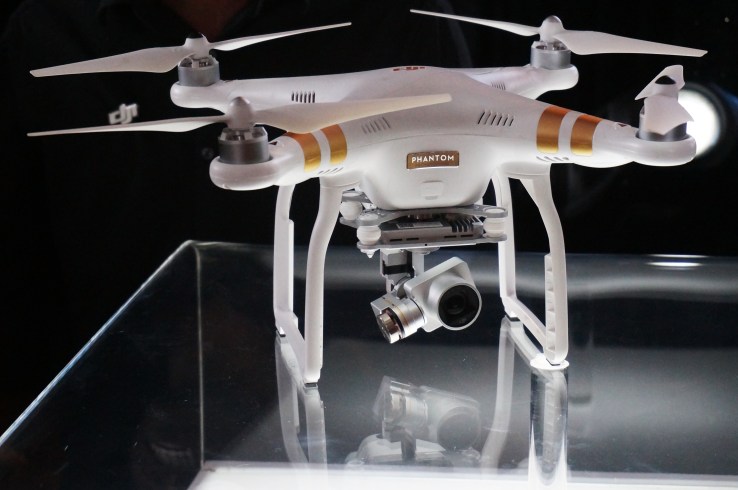 ISIS reportedly carried out its first successful drone attack this week, using a commercially available drone to deliver explosives and kill two Kurdish fighters. It’s an effort that has been a long time coming: a Facebook group dedicated to supporting Kurdish forces reported that two small drones packed with explosives were shot down in December, and reports of ISIS using commercial drones for reconnaissance and propaganda videos stem back to 2014.
ISIS reportedly carried out its first successful drone attack this week, using a commercially available drone to deliver explosives and kill two Kurdish fighters. It’s an effort that has been a long time coming: a Facebook group dedicated to supporting Kurdish forces reported that two small drones packed with explosives were shot down in December, and reports of ISIS using commercial drones for reconnaissance and propaganda videos stem back to 2014.
But this week’s attack marks the first time ISIS fighters have turned a diminutive hobby drone into a deadly weapon, the New York Times reports, and it has Pentagon officials racing to respond to the new threat.
The attack is also a problem for commercial drone companies — particularly DJI, the maker of the popular Phantom — which are now facing questions about how their products end up in the hands of the world’s most notorious terrorist group.
DJI enjoys about 60 to 70 percent of the commercial drone market, so it makes sense that the company is the one most often named in media reports of drone use by ISIS. The New York Times suggested that a Phantom might have been used in the fatal attack, writing, “The Islamic State is using simpler, commercially available drones such as the DJI Phantom, which can be purchased on Amazon.” Although DJI denies that its drone was used in the attack, the company acknowledges that ISIS has used its drones to conduct surveillance.
“The use of consumer-drone technology to harm anyone is deplorable. Any loss of life or injury in such a manner is tragic. Those who carry out such acts should be prosecuted to the full extent of the law. When governments come to us with lawful requests, DJI is ready to provide whatever technical assistance we can to those investigating this and other attacks,” a DJI spokesperson said in a statement.
DJI compared the situation the company has found itself in to that of Toyota. The automaker faced inquiries from counterterrorism officials last year who wanted to know how ISIS was obtaining so many Toyota trucks and SUVs. A Toyota spokesperson told ABC News that the company was reviewing its Middle East supply chains with the Treasury Department and has a policy against selling to terrorist or paramilitary purchasers.
But unlike a Toyota truck, the Phantom weighs less than four pounds and can be easily tucked away into a backpack and smuggled onto the battlefield. DJI says it complies with strict sale and import laws on UAV technology in the Middle East and does not sell its drones directly in Iraq or Syria, so its drones are likely being sold to ISIS in gray markets.
DJI also challenged the idea that the Phantom could be used to deliver an explosive payload. The Phantom can only carry about 200 grams, and the extra weight reduces the drone’s flight time and range. A DJI source said that a video of this week’s attack showed a larger, fixed-wing UAV — which presumably could carry more explosives than a Phantom. However, the bomb used in the fatal attack this week was disguised as a battery and contained “a very small amount of explosives,” according to the New York Times.
What’s undisputed is that Phantoms are taking flight in Iraq and Syria, sometimes piloted by ISIS militants (making matters even more complicated, drones are used in the area by NGOs for humanitarian purposes). Although DJI has offered to help government investigations, there’s not much the company can do except trace the origin of a drone by its serial number. DJI’s drones are manufactured at a factory in Shenzhen, China. A serial number would reveal when a drone was made and if it was purchased directly from DJI or through a third-party dealer, but beyond that, there’s not much of a forensic trail to follow.
In the meantime, DJI has used geofencing in the region to discourage the use of Phantoms on the battlefield. The company introduced geofencing three years ago in an effort to prevent consumers from flying their drones near restricted areas like airports, prisons, and nuclear power plants. DJI says Iraq and Syria are designated as ‘warning zones’ and that users there are notified that the area is not recommended for flight. However, the company hasn’t gone so far as to prevent flight in the region altogether, as it does in Washington D.C. for national security reasons. DJI argues that preventing all Phantom flights to hamper ISIS would also cripple good work being done by NGOs. Even if it did ban flights there, DJI says that the ban could theoretically be circumvented, since Phantoms aren’t shipped with military-grade encryption that would prevent a user from tampering with the restrictions.
The Pentagon is not relying on DJI or other drone manufacturers to prevent the use of drones by the Islamic State. “Military officials said that the Pentagon has dedicated significant resources to stopping drones, but that few Iraqi and Kurdish units have been provided with the sophisticated devices that the American troops have to disarm them,” the Times reports. The solution might be found in the consumer market — some companies are developing ways to take down out-of-bounds drones using radio waves.